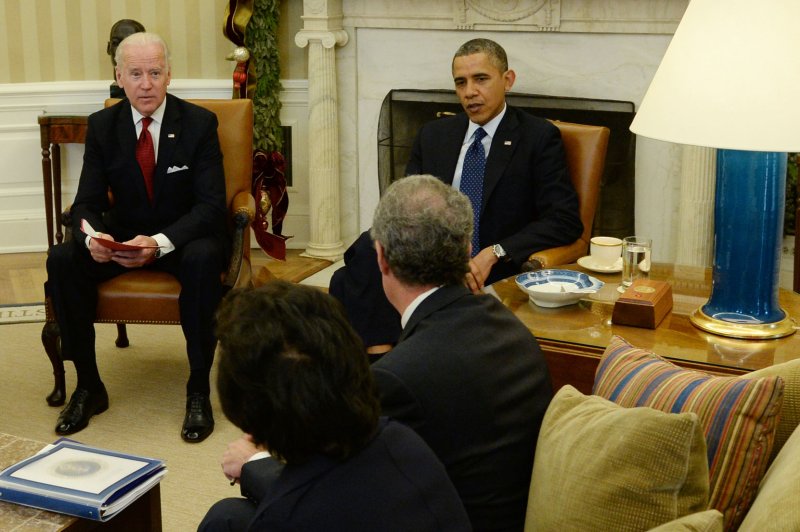WASHINGTON, Dec. 18 (UPI) -- U.S. President Barack Obama said Senate passage of a budget will help avoid "crisis-driven decision-making" but urged Congress to extend unemployment insurance.
The Senate voted 64-36 in favor of the two-year budget, which had been approved by the House last week, sending it to Obama for his signature.
In a statement issued by the White House, the president said the budget "unwinds some of the damaging sequester cuts that have harmed students and seniors and acted as headwinds our businesses had to fight."
"All told, it's a good first step away from the shortsighted, crisis-driven decision-making that has only served to act as a drag on our economy," he said. "It helps chart our economic course for the next two years, which means that the American people won't be exposed to another painful and unwise government shutdown."
Obama said Congress should pass an extension of unemployment insurance "so more than a million Americans don't lose a vital lifeline as they fight to find a job."
"This deal is a compromise," said Senate Budget Committee Chairman Patty Murray, D-Wash., who negotiated the measure with House Budget Committee Chairman Paul Ryan, R-Wis.
"It doesn't tackle every one of the challenges we face as a nation, but that was never our goal.
"This bipartisan bill takes the first steps toward rebuilding our broken budget process -- and, hopefully, toward rebuilding our broken Congress. We've spent far too long here scrambling to fix artificial crises instead of working together to solve the big problems we all know we need to address."
Supporters said the budget will eliminate the threat of a government shutdown for two years.
The vote came a day after 12 Republicans voted with 55 Democrats to end formal debate -- overcoming a 60-vote filibuster threshold and all but assuring final passage Wednesday.
The budget deal, which sailed through the House by a 332-94 vote Thursday, calls for defense and non-defense spending to rise to $1.012 trillion this fiscal year, up from the $967 billion already slated. The increase eases across-the-board spending cuts known as budget sequestration.
Spending next fiscal year, starting Oct. 1, would rise to $1.014 trillion from $995 billion.
The measure -- which calls for no tax hikes or entitlement reforms -- phases in fee increases and spending offsets lawmakers promise will lead to $23 billion deficit reduction over a decade.
"There's a heavy sigh going on in our caucus right now, because people like me are looking at this and saying: 'Is it a good deal? No. But is it a deal? Yeah,'" Sen. Lisa Murkowski, R-Alaska, told the Washington Post.
She voted to advance the legislation Tuesday and for final passage Wednesday.
"I have tried to look at this on balance. And on balance, the benefit of having a deal is better than no deal," she said.
Sen. Jess Session, R-Ala. -- the ranking member of the Budget Committee -- tried to offer an amendment Tuesday to drop a provision cutting military pensions $6 billion over 10 years, but his effort failed, the Hill reported. Sen. Kelly Ayotte, R-N.H., told reporters the provision -- which would reduce cost-of-living adjustments 1 percent for military retirees younger than 62 -- was "a deal-breaker" that "singles out our military retirees."
Sen. John McCain, R-Ariz., one of the few senators who served in the military, dismissed the outcry. He said even high-ranking Pentagon officials acknowledge the need to rein in the cost of military benefits.
Once Obama signs the bill, lawmakers will have to decide how to divvy up the money among programs and agencies, and draft detailed spending bills before Jan. 15, when current spending authority expires.















